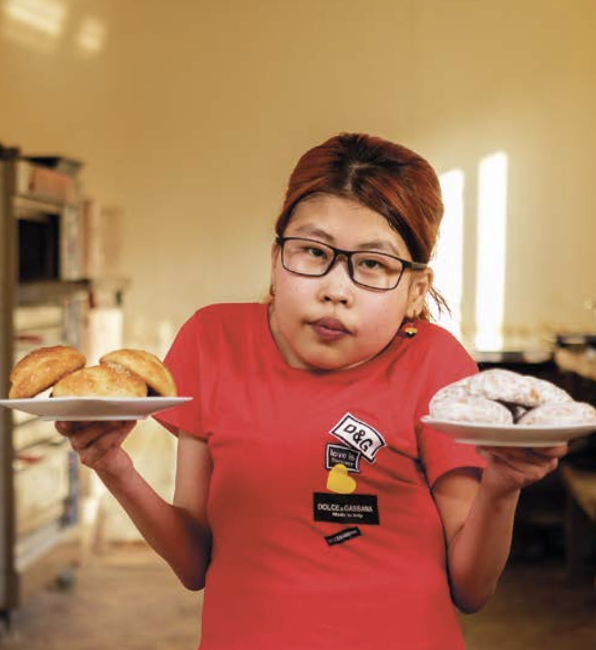Anara is a determined young entrepreneur who runs a bakery in Uchkun village. At the age of 13, Anara had to drop out of formal school education due to her health conditions. Upon her teacher’s recommendation she enrolled in the English Access Microscholarship Program (ACCESS) for students with disabilities where she learnt English and how to design projects and prepare grant applications.
For many individuals with disabilities of employment age, finding a job can be a daunting prospect and the process can involve many challenges and uncertainties. With USAID-funded support, Anara turned her life-long passion of baking into an entrepreneurial venture by opening an in-house bakery: Tortoniya. Anara’s resourceful business acumen compelled her to start a side business of chicken breeding that provides eggs for her bakery. Anara improved her entrepreneurial skills through various training courses in bookkeeping and business management.
Anara’s family is very supportive of her business. Her mother helps in baking, her grandfather with deliveries and her grandmother (who runs a beekeeping business) provides entrepreneurial advice. She dreams of running a successful online business, so she stays up late learning computing and graphic design skills. She currently runs Tortoniya’s social media page and manages online orders via Instagram.
Tortoniya’s sales are steadily growing. Anara can now afford to hire full- time employees and expects to create 10 full-time jobs for women in her village. She also mentors others including ten aspiring bakers from the neighbouring Yshkavan village who found out about Tortoniya and visited the shop. Anara openly shares her tips for running a successful bakery business. It was very challenging for Anara to participate in learning opportunities in person, however, her perseverance and family’s support made it possible to overcome the barriers she faced. Anara discussed the limitations in doing simplest things such as going to the city or entering a building without someone’s assistance, “buses are high and cannot load wheelchairs, building entrances lack ramps and in order to go somewhere my mom orders a taxi which is expensive. There is an American Corner which offers training, however, I don’t go there because they have steep staircases and no elevator. My mom cannot go with me everywhere as she might not always be available.”
While support from family and friends as well as international organisations helped her to start a business, it was Anara’s entrepreneurial spirit and dedication in seizing opportunities that led her to achieve her goals. Anara explained, “As a person with a disability, if you do nothing with your life, it may seem to you that people are fine with it. They won’t tell you that you need to get up and do something because either they don’t understand, or they don’t know how to tell you otherwise”. She thinks that sometimes not having the right push from friends and family may disincentivize people with disabilities. However, for Anara her disability made her resilient and forced her to take initiatives from a very young age, “these characteristics have enabled me to move myself forward in life and search for success.” Young women with disabilities, like Anara, are challenging societal preconceptions to overcome the obstacles they face.
Anara Erkebayeva
